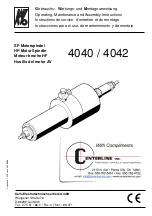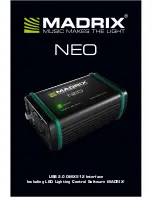
OWNER DETAILS
Name
Vessel
CONTACT
Tel.
BEACON REGISTRATION
!
It is the owner’s responsibility to register
this beacon with the appropriate National
Authority before operation.
Documentation is provided within the packaging with
information regarding registration with the relevant
body to comply with the required configuration of the
beacon.
ATTACH YOUR BEACON DETAILS HERE
Category 1
406MHz EPIRB
(With AIS and RLS)
7. Specifications
406MHz Transmitter
Transmit Power (EIRP)
12W
Frequency
406.031 MHz ±1KHz
Modulation
Phase ±1.1 Radians (16K0G1D)
Encoding
Biphase L
Rate
400 bps
AIS Transmitter
Transmit Power (EIRP)
1Watt±3dB
Frequency
161.975/162.025MHz ±500Hz
Baud rate
9600baud
Synchronisation UTC
Messages
Message 1 (Position), Message 14 (Status)
Repetition interval
8 messages/minute
Message 14 sent twice every 4 minutes
121.5MHz Transmitter
Transmit Power (PERP)
50mW±3dB
Frequency
121.5 MHz
Modulation Duty Cycle
>35%
Modulation Factor
0.85 to1.00
Frequency Stability
±50ppm
Duty Cycle
>98%
Strobe and Night Vision Lights
Light Type
High Intensity LED & Infrared (IR)
Light Colour
White and IR
Average Intensity Visible
>1 candela
Average Intensity Night Vision Light
15mW/sr
Flash Rate
24 per minute (nom.)
Battery
Type
Lithium Iron Disulphide (LiFeS2)
Operating Time
>48Hours @ -20°C
Battery Replacement Period
10 years
GNSS Receiver
Satellite Channels
72 acquisition
Sensitivity
-167dBm
Cold Start / Re-acquisition
-148dBm / -160dBm
GNSS Antenna
Microstrip Patch
General
Dimensions of EPIRB (Inc. antenna)
410mm x 90mm x 101mm
(16.1 x 3.5 x 3.9 in.)
Weight
(EPIRB Only)
422grams (0.92lbs)
Dimensions of Automatic Release Housing
237mm x 191mm x 121mm
(9.3” x 7.5” x 4.8”)
Weight (Inc. EPIRB)
1,252grams (2.76lbs)
IEC60945 Category
Portable
Operating Temperature
Class 2 -20C to +55C
Storage Temperature
Class 2 -30C to +70C
Waterproof (EPIRB)
10m depth for 1 hour
Auto Release Depth
4m maximum
EPIRB3 Pro
DOWNLOAD THE
FULL USER MANUAL
oceansignal.com/products/epirb3-pro
912S-03970 v01.11
14/11/2022
GET THE MOBILE
APP. TO SEE YOUR
BEACON’S TEST
INFORMATION
Android iOS
1.
ABOUT Y
OUR AIS
EPIRB
1.1
COSP
AS/SARSAT Sys
tem
The basic Cospas-Sarsat c
oncept is illus
trat
ed in the
adjacent figur
e. The System is c
omposed of:
•
distr
ess r
adio beacons (EL
Ts f
or aviation
use, EPIRBs for maritime use, and PLBs f
or
personal use) which tr
ansmit signals during
distr
ess situations
•
instruments on boar
d satellit
es in geosta
-
tionary and low-altitude Earth orbits which
detect the signals tr
ansmitted by dis
tres
s
radio beac
ons
•
ground r
eceiving s
tations, r
eferr
ed to as Loc
al Users T
erminals (LUT
s), which rec
eive and
proc
ess the sat
ellite do
wnlink signal to gener
ate dis
tres
s alerts
•
Mission Contr
ol Center
s (MCCs) which rec
eive al
erts produc
ed by LUT
s and forwar
d them to
Rescue Coordination Cent
ers (RCCs), Sear
ch and Rescue Points Of Cont
acts (SPOCs) or other
MCCs
The Cospas-Sarsat Sys
tem includes tw
o types of satellit
es:
•
satellit
es in low-altitude Earth orbit (LEO) which f
orm the LEOSAR System
•
satellit
es in geostationary Earth orbit (GEO) which f
orm the GEOSAR System
The future Cospas-Sar
sat System will include a ne
w type of satellit
e in the medium-altitude Earth
orbit (MEO) which will form the MEOSAR Sys
tem.
1.2
Return Link Service
The Galileo Return Link Servic
e (RLS) is a free-of-char
ge global servic
e availabl
e to Cospas-Sar
sat
RLS compatibl
e beacons. The ne
w functionality, curr
ently off
ered uniquel
y by Galileo, enabl
es a
communic
ation link that relays Return Link Mes
sages (RLM) back to the originating beac
on through
the Galileo Navigation Signal in Spac
e.
The RLS featur
e is an indication on the EPIRB3 Pr
o that confirms t
o the User that the distr
ess signal
from the EPIRB3 Pr
o has been loc
alised by the Cospas-Sarsat sys
tem and is being sent t
o the
SAR authorities. It does NOT mean that a sear
ch and rescue mis
sion has been launched, but only
confirms that the dis
tres
s alert has been r
eceiv
ed by the Cospas-Sarsat sys
tem and is being r
outed
to the appr
opriate SAR agencies. The RLS aims t
o send an acknowl
edgment to the beac
on within 30
minutes f
ollowing activ
ation (the response may not be r
eceiv
ed by the beacon f
or significantl
y longer).
RLS is an optional function and may not be permitted in all c
ountries. The full RLS specification c
an
be found her
e: https://gsc-europa.eu/sit
es/default/fil
es/sites/all/fil
es/Galileo-SAR-SDD.pdf
1.3
AIS System
AIS systems oper
ate on VHF r
adio bands and transc
eiver
s are fitt
ed to all c
ommercial shipping and an
ever gr
owing number of r
ecreational v
essels gl
obally. Shortl
y after activ
ation an AIS Man Over Boar
d
devic
e will activat
e an alarm on all AIS equipped ves
sels within VHF range al
erting them to the f
act
that a person is in the wat
er needing assis
tanc
e. Often it
is a ves
sel in the close vicinity of an incident that is abl
e
to r
eact and effect a r
escue quicker than the emer
gency
services.
Emergency servic
e craft ar
e fitted with AIS r
eceiv
ers
allowing them t
o pinpoint a casualty in the wat
er more
precisel
y than any other system.
IN CASE OF EMERGENC
Y
USE ONLY IN SITUA
TIONS OF GRAVE AND IMMINENT D
ANGER
MANUAL ACTIV
ATION
1
2
3
4
5
6
7
8
Pull the pin
Release the c
atch
Turn the knob
Remove the c
over
Release the EPIRB
Break the t
ab
Lift the flap
Pres
s the button
NOTE:
Remove the rubber lany
ard c
over and tie the lany
ard t
o the life r
aft or your per
son
to pr
event l
oss. DO NO
T tie to a v
essel in that is in danger of sinking.
NOTE:
Once r
emoved fr
om the brack
et the EPIRB3 will automatic
ally activ
ate when plac
ed
in the water
. To deactiv
ate r
emove fr
om the water
.
Lanyar
d Cover
Pending


































